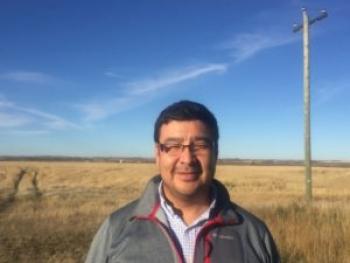Image Caption
Audio
By Brittney Pastion of CFWE-FM
Windspeaker.com Contributor
The realities of climate change can have you feeling defeated. Dr. Kevin wâsakâyâsiw Lewis from the Ministikwan Cree First Nation, Sask., located about 45 minutes east of Cold Lake, Alta., chooses to simplify his response to it by going back to traditional ways and utilizing what the Elders have to say:
Go back to our prayers. Go back to our way of life. Start living that balanced lifestyle again.
Lewis, who is in the process of finishing his doctoral program at the University of Blue Quills, is working towards curriculum development and promoting land-based learning along with Cree language development. He developed a grassroots not-for-profit group and set up kâniyâsihk Culture Camps based in Saskatchewn to get people back out on the land as part of their education.
“We started taking students out, adults, teachers and university students and started teaching them about medicines—just really basic—fishing, hunting, and harvesting skills.”
The camps run all season, but he says the most important season for learning is the summertime, because the Elders like to come out.
The summer brings them out to collect medicines and berries, and going into ceremonies, singing their songs.” So summer is a really good time to be with them.
“We like to say that Elders are our professors, our libraries, our teachers”. Lewis believes we don’t utilize them as much in the wintertime, because Elders get cold and don’t want to leave their warm houses.
Elders are used as an assessment tool. They have brought attention to the fact that animals and fish are acting differently in the age of climate change.
The geese stayed around a lot longer, this year, for example, he said. It’s was very confusing, and hard to gauge what kind of winter we are going to have.
“Being out there, we were trying to go pick berries in Saskatoon-time and pick Saskatoon berries. We couldn’t find any, because there was not that many bees around.”
Climate change is making it necessary to adjust our thinking about how to read the signs of nature, the animals, the insects.
Dr. Lewis spoke at the recently held Treaty 8 Climate Change Symposium, adding to the conversation and sharing why land-based learning is so important.
It’s a discussion he thinks should be welcome in Alberta, where the symposium was held, because the province is heavily invested in oil and gas development. While Alberta was leader economically, it may have lagged behind on the environmental front. But there is hope.
“I sat down with Elders a couple of weeks ago, and what I heard there was, it wasn’t doom and gloom where the sky is falling.” What they said was “We can get through this, because we’ve gone through this a number of times already.”
For more information on culture camps: http://kaniyasihkculturecamps.com/

